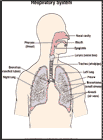
Pneumonia
Admission Information and Discharge Instructions
What is pneumonia?
Pneumonia is an infection of the lung(s) that causes fluid to collect in the air sacs (alveoli).
Symptoms include:
- labored breathing
- rapid breathing
- occasionally painful breathing
- coughing
- fever, sometimes with chills
- abnormal patch (infiltrate) on chest x-ray.
Note: Most rattly breathing is not pneumonia.
What is the cause?
About 80% of pneumonia cases are caused by viruses and 20% by bacteria. Viral pneumonia is usually milder than bacterial pneumonia. Bacterial pneumonia tends to occur more suddenly and cause higher fevers (often over 104°F, or 40°C). Pneumonia is usually a complication of a cold. Although you can pass a cold from person to person, bacterial pneumonia is not considered contagious.
Why was my child admitted to the hospital?
Main complication:___________________________________________.
___ Needs antibiotics.
___ Needs oxygen.
___ Needs IV fluids.
___ Other reason:____________________________________________.
How long will it last?
Only bacterial pneumonia is helped by antibiotics. Because it's difficult to distinguish bacterial from viral pneumonia in all cases, sometimes antibiotics are prescribed for children when the type of infection is uncertain.
Before antibiotics were available, bacterial pneumonia was dangerous. With antibiotics it improves within 24 to 48 hours. On the other hand, viral pneumonia can continue for 2 to 4 weeks. Recovery from viral pneumonia is gradual but complete.
Most children with pneumonia can be cared for at home. Children admitted to the hospital are usually young infants or children, those who have large areas of pneumonia (as determined by an x-ray), or those who are vomiting.
Recurrences of pneumonia are rare.
What are the requirements for discharge?
- ________________________________________________________
- _______________________________________________________
- _______________________________________________________
How can I take care of my child?
- Antibiotics
Children with bacterial pneumonia need an antibiotic. Your child's antibiotic is ___________________________. Give ______________ every ______ hours. Continue the antibiotic for ______ days. Give the medicine even if your child is feeling better.
- Medicines for fever
Use acetaminophen or ibuprofen for fever over 102°F (38.9°C). Acetaminophen can be given every 4 to 6 hours. These medicines can also help chest pain.
- Warm fluids for coughing spasms
Coughing spasms are often caused by sticky secretions in the back of the throat. Warm liquids usually relax the airway and loosen the secretions. Offer your child warm lemonade, apple juice, or herbal tea. Children over 1 year old can sip warm chicken broth. Encourage your child to drink a lot of fluids.
In addition, breathing warm moist air helps to loosen sticky mucus. You can provide warm mist by placing a warm wet washcloth loosely over your child's nose and mouth. Or you can fill a humidifier with warm water and have your child breathe in the warm mist it produces. Avoid steam vaporizers because they can cause burns.
In general, don't give cough-suppressant medicines (such as those containing dextromethorphan) to children with pneumonia. The infectious secretions need to be coughed up. Some health care providers suggest only using these cough medicines before bedtime.
- Humidity
Dry air tends to make coughs worse. Use a humidifier in your child's bedroom.
- No smoking
Tobacco smoke aggravates coughing and makes coughs last longer. Don't let anyone smoke around your child. In fact, try not to let anybody smoke inside your home. Remind a teenager with pneumonia that if he or she smokes, the cough will last weeks longer.
- Other medicines
________________________________________________________
________________________________________________________
________________________________________________________
- Additional instructions
_______________________________________________________
_______________________________________________________
When does my child need to be seen again?
___ Your child needs to be rechecked and has an appointment on _____________ at _______ with _________________________.
___ Your child needs to be rechecked in ________ days. Call your child's doctor to make an appointment.
When should I call my child's health care provider?
Call IMMEDIATELY if:
- Breathing becomes more labored or difficult.
- The fever returns.
- Your child starts acting very sick.
Call during office hours if:
- You have other questions or concerns.

